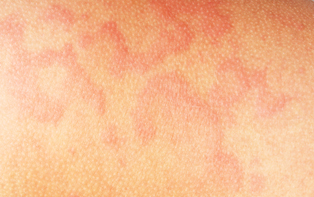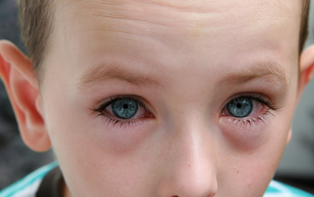Yes, you can be allergic to the cold!
Yes, you can be allergic to the cold and, in this case, it has nothing to do with how much we may dislike our brutal Quebec winters! Also known as cold urticaria or hives, this skin reaction to cold temperatures affects approximately 5 in 10,000 people.

Triggers
Cold urticaria occurs when the temperature of the skin drops following exposure to cold air, water or objects or when the oral and esophageal mucous membranes cool after being in contact with cold foods or beverages, potentially causing lesions to the skin or tissues.
 Triggers include:
Triggers include:
- Very cold weather, cold winds and even rain
- Swimming in cold water
- Bare feet on cold floors
- Air conditioning
- Cold beverages or foods, such as a soft drink or frozen treat
Symptoms
As with other allergies (e.g. hay fever), the mast and basophilic cells located beneath the skin are activated – in this case by the cold – and release histamine and other chemical mediators, causing the hives. Since the cold is not an allergen per se, some people are reluctant to refer to this response as an allergic reaction.
People who have this condition will experience the following symptoms when exposed to marked temperature changes:
- Itchy skin rashes that look like mosquito bites.

- Swelling of the eyes and face.
 Symptoms mainly develop in the areas exposed to the cold, but can sometimes spread to other parts of the body. They generally disappear on their own after a few hours or days.
Symptoms mainly develop in the areas exposed to the cold, but can sometimes spread to other parts of the body. They generally disappear on their own after a few hours or days.
Prevention and treatment
Here are ways to prevent this allergic-type reaction:
- Avoid exposure to the trigger – the cold.
- If you absolutely must go outside on a cold day, cover your entire body well, including your face.
- Take an antihistamine to prevent, reduce or eliminate the allergic reaction. To learn the correct dose for this condition, speak with your doctor or family pharmacist.
If you are allergic to the cold, do not take it lightly. Avoid exposing your body to extreme temperature variations, such as diving in cold water after taking a dry sauna or steam bath, since, though rare, the allergic reaction could cause a life-threatening anaphylactic shock. Some people will need a prescription for an adrenaline injector.

Diagnosis
If you think you may be allergic to the cold, you will need to consult an allergist, who will administer the ice cube test. This test consists in placing on your forearm an ice cube wrapped in plastic for 5 to 20 minutes. If a welt or rash appears within 15 minutes after applying the ice, the test is positive. The faster the reaction occurs, the more severe the allergy to the cold.
Pharmacy services
Do you have questions about your allergies? Speak with your family pharmacist for answers and information.
The pharmacy services presented in this section are offered by pharmacist owners who are affiliated with Uniprix. The pharmacists are solely responsible for the professional activities carried out during the practice of pharmacy. These services are offered in participating pharmacies only. Certain fees and conditions may apply.
* The information contained herein is provided for informational purposes only and is not intended to provide complete information on the subject matter or to replace the advice of a health professional. This information does not constitute medical consultation, diagnosis or opinion and should not be interpreted as such. Please consult your health care provider if you have any questions about your health, medications or treatment.
